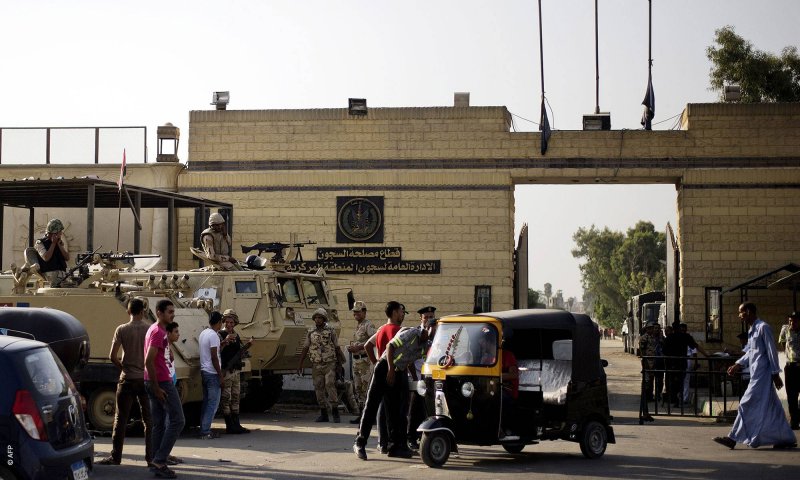On Monday, Egyptian authorities organized a media tour to Tora prison complex. The polished visit was prompted by the United Nations reporting that former President Mohammed Morsi’s death after enduring “brutal” conditions in detainment could amount to a State-sanctioned arbitrary killing”. In sharp contrast to the circumstances the UN detailed parliamentarian Mostafa Bakry argued that the “prison is more of a seaside resort”. How does the administration present its prisons to the international community? Raseef22 discussed the matter with former prisoners, rights advocates and witnesses.
Hygienic, Spacious Cells
Photographs of clean prison cells housing no more than a handful of people, with the inmates’ beds separated by nightstands, circulated on social media. Chairs and several pillows are also provided to the prisoners.
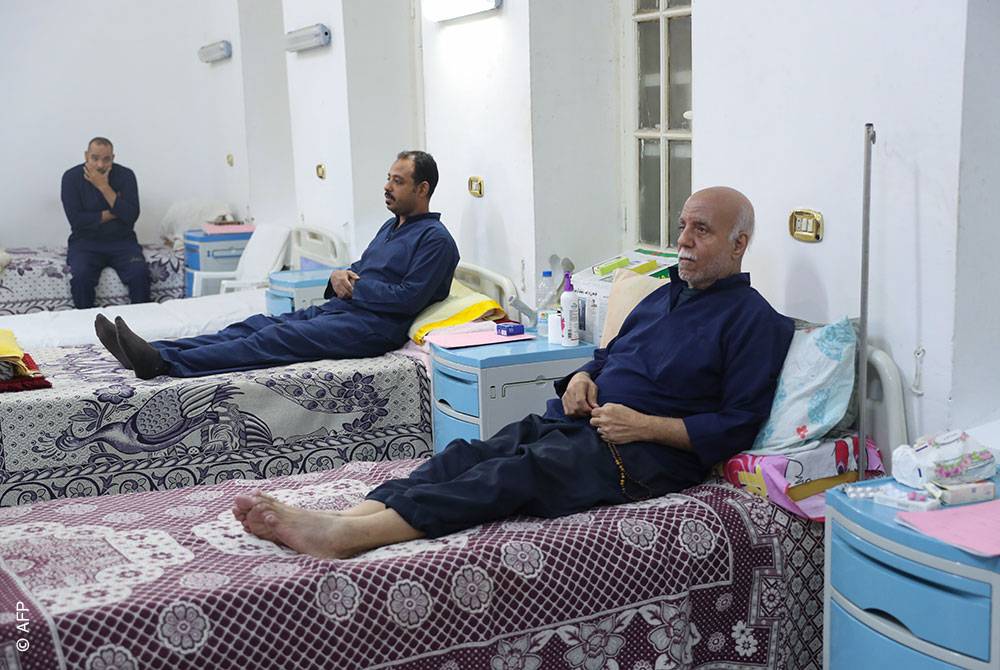
A former political prisoner and rights advocate whose name Raseef22 is not disclosing to protect his safety recalled his experience in a central prison. “We were 48 people in a cell sleeping on the floor. The space I got was what they call ‘two hand spans and a fist’, barely the space my body takes up, one is given a small blanket, so you have to pick the area you want covered: your torso or your feet”.
This confirms the UN saying that “[Morsi] was forced to sleep on a concrete floor with only one or two blankets for protection”.
Aida Seif Al Dawla, a psychiatrist and retired university professor and founding member of Al Nadim Center Against Violence and Torture, confirmed that prisoners do not sleep on beds, further described the cells as “overcrowded, lacking ventilation, [and] in some cases the toilet is a bucket”.
Morsi was also placed in solitary confinement for six years until he died on June 17. Ahmed Abdelmoneim Aboulfotouh, son of former Presidential candidate Abdelmoneim Aboulfotouh, spoke to Raseef 22 of his father’s current solitary confinement. “He is not only alone in his cell, he is alone in the entire ward. He is cut off from life, from all communication with the outside world. He is not allowed books, newspapers, or radio, even though these things are legal. He sits in complete silence”.
The Tora Football Team
Inmates, in new sportswear, playing a match in a green football pitch were also spotted on the prison tour. Alaa Abed, the head of parliament's human rights committee who was a former policeman noted that “inmates are not sitting in their cells...there are a lot of activities for them”. Prison regulations dictate a minimum of one hour of tarayod, time outside the cell meant for exercising, said prisoner-turned-lawyer Tarek Hussein.
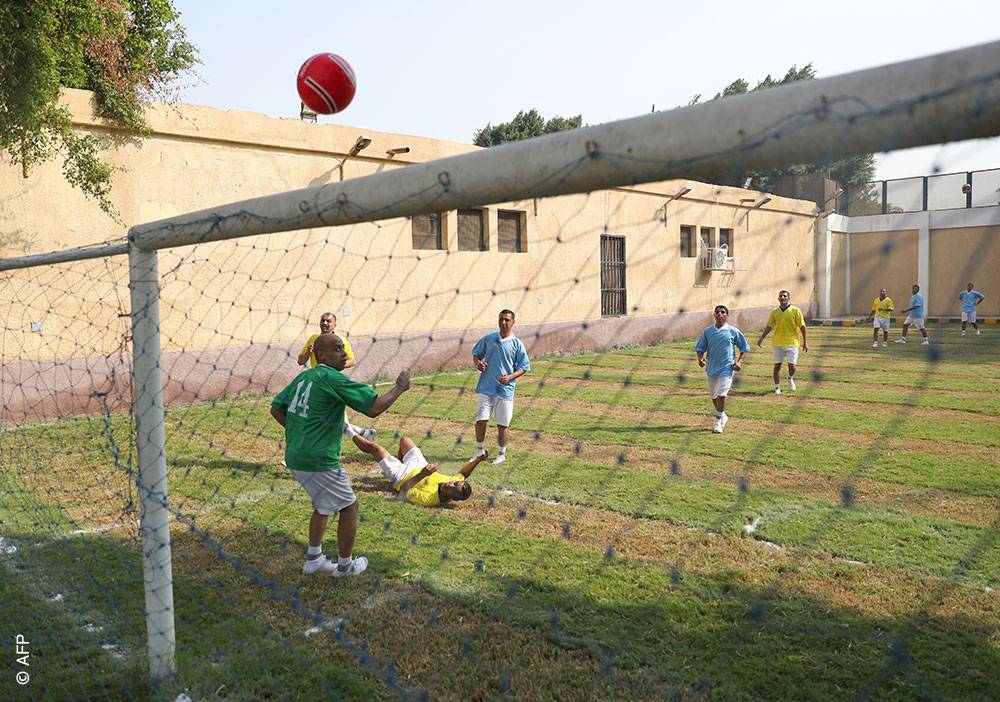
While this time is meant to be spent in open air spaces, in practice it constitutes of a walk in a narrow corridor with concrete walls and a wired ceiling, said Seif Al Dawla. This is the case with Aboulfotouh, who takes walks in an internal, deserted corridor. He was not allowed any tarayod time at first, his son said. Seif Al Dawla asserted that tarayod is denied to many prisoners, and the whole prison at times.
The only time Aboulfotouh gets sun is when he gets a family visit, as he is taken from his cell to High Security Prison Two. “We talk to him from behind glass, through phones, which the National Security officer bluntly told us he is listening to and recording,” Ahmed Aboulfotouh said. While the visit is supposed to be up to an hour, according to lawyer Hussein, it usually lasts for 10 minutes, sometimes after eight hours of waiting.
In July, Amnesty International condemned he Egyptian authorities forbidding regular family visits at al-Aqrab maximum security prison in Tora, where approximately 130 detainees have gone on a mass hunger strike for more than six weeks. Many have not been allowed a single visit from their families or lawyers for two years.
“By refusing to allow detainees to see their families, the Egyptian authorities are flagrantly flouting both Egyptian and international law and displaying callous cruelty,” Amnesty stated.
Sparkling Vegetables and Cooking Parties
Photos of prisoners barbequing meat in spotless aprons and surrounded by soft drinks fridges stirred online ridicule. Fruit plates covered in plastic, a display of ostrich eggs, poultry and cattle farms, and inmates chopping high-quality vegetables were also displayed on the tour.
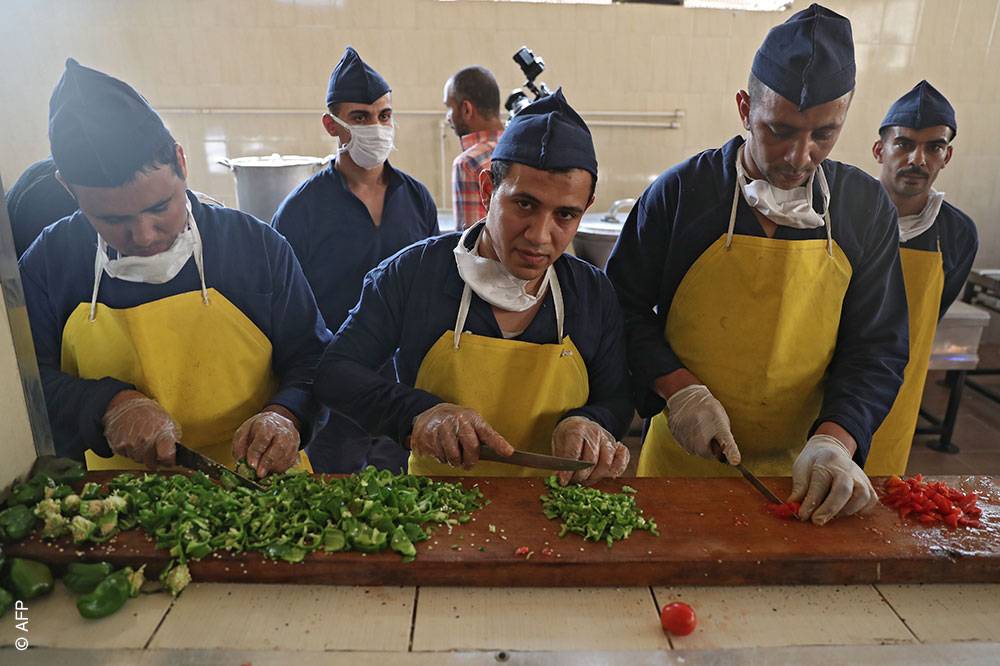
The former prisoner who spoke anonymously to Raseef22 recalled being served mushy rice. “The food is bad and the quantity is meager. Even food brought by the families is searched and reduced in amount before it is allowed in,” Seif Al Dawla, continuing, “It would take a lot of stupidity and denial to believe that this is real. I am not even sure if those were prisoners or prison staff”.
Torture Allegations are from Foreign Enemies
Bakry said that inmates were treated with dignity. In response to concerns around abuse, the MP said that they “were foreign-originated charges designed to sow chaos in Egypt”, according to AFP.
“State officials are liars, or they are not aware what torture entails” said Seif Al Dawla. Human rights organizations have documented hundreds of abuse and torture incidents, the most recent being prominent rights lawyer Mohamed Al Baqir and activist Alaa Abdel Fattah. Abdel Fattah was arrested from parole and taken to the very Tora prison complex where the Monday tour was organized.
When Abdel Fattah was blindfolded upon arrival, and was made to strip down to his underwear, and was slapped, kicked, verbally abused, forced to bend his back, and humiliated, according to his family. A typical “reception” party. When he reached an official whom everybody addressed as “pasha”, the latter said that he hated the 2011 revolution, hated Abdel Fattah, and that these prisons are built to “discipline people like you, and that you will remain in prison for the rest of your life”. The activist was taken to his cell, and remained blindfolded from the evening of the 29th of September until the early hours of the following day.
Egypt contends prisoners lives is akin to life in 3 star medical facility in Ohio, the reality is nothing of the sort, crammed facilities, buckets for toilets, no exercise or healthcare and mushy rice is on the daily menu
The son of former presidential candidate Abdelmoneim Aboulfotouh recounts the conditions his father is detained in: He is not only alone in his cell, he is alone in the entire ward. He is cut off from life, from all communication with the outside world
“We have such testimonies from prisons across the country from Alexandria to Aswan...We know of detainees who were threatened while in prison by state security officers of rape, harm to the family, permanent disappearance, etc,” Seif Al Dawla said.
Chairman of the State Information Service Diaa Rashwan wrote in Al Shorouk Newspaper challenging anybody to claim there is torture in prisons. “But he never says how to execute this challenge,” Seif Al Dawla pointed out. No one has access.
“One just has to compare the faces of detainees before and after being held in prisons to note the extent of maltreatment they suffered. Some detainees are being carried into courts not able to walk,” the psychiatrist remarked.
Excellent Medical Facilities
“Wonderful Hospital, Medical Equipment, Medeines, Specialized Clinics” tweeted Bakry.
Hussein contends this, saying that prison hospitals are unequipped for operations, and for prisoners to go there it takes a long procedure, and in the end the hospital does not necessarily treat a prisoner. “The way prisoners are treated there is also bad,” he mentioned.
“Access to a prison doctor has to go through the guards, the informants, the prison officer in charge, the paramedic and then finally the doctor, if all of the previous individuals agree that the condition required attention,” explained Seif Al Dawla.
In the middle of Abdel Fattah’s beating, a person who identified himself as the prison physician, asked him if he had any injuries or any illnesses. Abdel Fattah told him that his body has a history and tendency to form renal stones and that he is in need of potable water for drinking. The doctor left and the beating continued.
Aboulfotouh’s son revealed to Raseef22 that his father fell on his knees 25 days ago. He requested an xray and an examination, but his request was denied. He got a slipped disc from prison. He has also been suffering heart attacks, and has asked to see a cardiology consultant, but also in vain.
Nubian rights defender Gamal Sorour died in November 2017 after being denied his diabetes medication for five days. Morsi had also been complaining of medical negligence, which the UN described as being slowly killed. This stands in contrast to the treatment received by ousted President Hosni Mubarak, who is still alive, Seif Al Dawla pointed out.
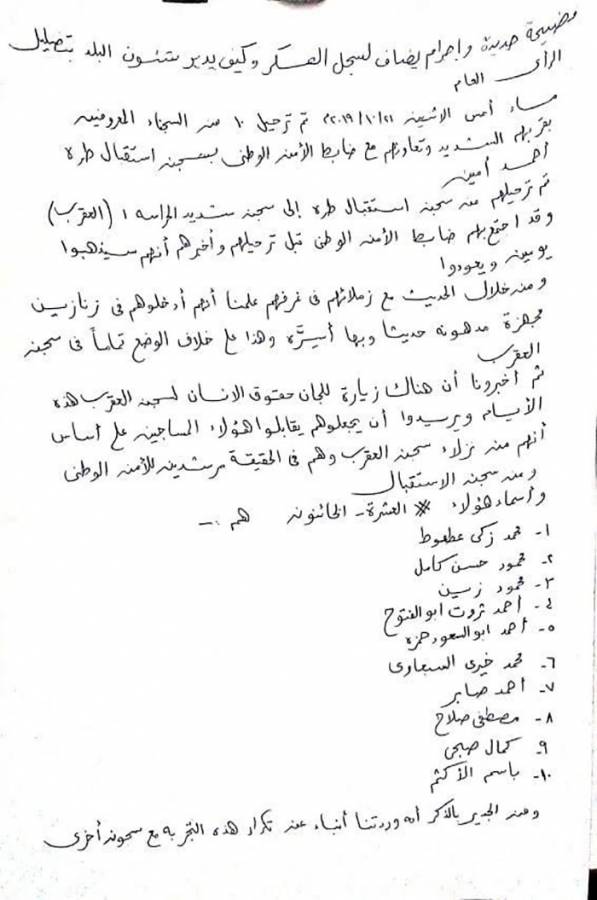
Egypt has No Political Prisoners
Sisi claims that there aren’t any political prisoners in Egypt. Yet, following protests on 20 September calling for his removal, almost 4000 people were arrested. Human Rights Watch estimates that at least 60,000 Egyptians have been put behind bars on political grounds.
The Monday tour was an “orchestration of a scene that hundreds of testimonies by detainees and their families refute,” Seif Al Dawla held, adding, “It is as pathetic as a third degree soap opera. It was reflective of one reality which is the regime’s conviction that they could bluff the world with a ridiculous show off of a situation that only exists in its imagination and which, sadly enough, it thinks the world will believe”.
Wednesday marks the beginning of the Universal Periodic Review. “If [the visit] was meant to be a boost before the UPR starting tomorrow, it shows that the government is underestimating everybody's intelligence,'' she said.
Seif Al-Dawla believes that regimes like Sisi's can rule either with bribery or oppression. “There is nothing to give the needy in return to buy their silence, not with our economic policies, not with the level of corruption, and you cannot oppress humanely. They have the power and they are not accountable to anybody. Power when not checked, I think, is always brutal. So why not do it, if they can get away with it. And they are paying back for very single act of defiance and sense of pride the January 2011 revolution allowed people to enjoy”.
Ahmed Aboulfotouh said that Tora Farms Prison, one of the prisons at the complex, does provide everything shown on the tour. It has a gym, a library, and any food can be delivered. He remarked that that prison is where Mubarak and businessman Ahmed Ezz were kept. “It is not a matter of if they exist, but rather for whom”.
Raseef22 is a not for profit entity. Our focus is on quality journalism. Every contribution to the NasRaseef membership goes directly towards journalism production. We stand independent, not accepting corporate sponsorships, sponsored content or political funding.
Support our mission to keep Raseef22 available to all readers by clicking here!
Interested in writing with us? Check our pitch process here!
